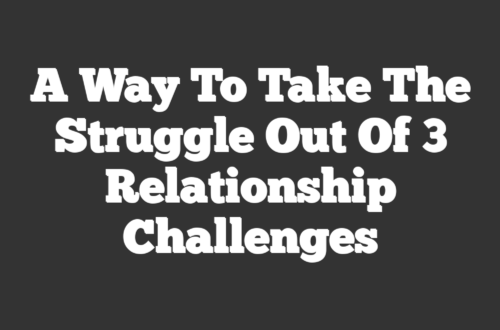
Confidence is the cozy blanket that warms a relationship. It’s about believing in yourself and showing up as you are, not just for you, but for your partner too. It’s the little things—speaking your mind, sharing your smile, and nurturing the ‘us’ without losing the ‘you’.
So, what’s the secret ingredient to that unshakeable confidence? Could it be as simple as a morning look in the mirror or as grand as an open conversation with your partner?
Hang on as we take this step-by-step journey to a more confident you in love.
Communicate Openly and Honestly
It’s important to share your thoughts and feelings with your partner, even if they’re hard to say out loud. This doesn’t mean you need to chat all day long, but when you do talk, let it be genuine. Stick to what’s true for you, and listen when your partner does the same.
- When it’s your turn to talk, make sure to express your own feelings rather than assuming what your partner thinks or feels.
- Really listen when they’re sharing with you, not just with your ears, but with your heart, too.
- Remember that it’s not about winning an argument; it’s about understanding where each of you is coming from.
Sometimes we hold back because we worry about rocking the boat. But think about it: when you don’t talk about what’s bugging you, it doesn’t go away. It just builds up until one day, it explodes. That’s not what we want, right? So, practice being open and you’ll see how it strengthens the trust between you two.
Trust Your Partner
Trust grows when you believe they have your best interests at heart. So, how can you build this trust? Well, start with honesty, as we just talked about. It sets the stage for trust. Keep the promises you make, and when you mess up, admit it and apologize.
- Show consistency in your actions and words. Saying one thing and doing another can send mixed signals.
- Be there for them in good times and bad. It’s easy to be a fair-weather friend, but standing by them on a stormy day – that’s trust-building.
- Give them space to be themselves and have their own experiences. It’s about respecting their independence, too.
Keep in mind that trust doesn’t sprout overnight. Sometimes, it’s challenging, and you might feel tempted to check their phone or question their stories. But pause and remind yourself that trust is about letting go of control. Give your partner a chance to show you they are trustworthy.
Recognize Your Value
Have you ever noticed how we are usually our own toughest critics? It’s easy to focus on our flaws rather than celebrating what makes us unique and valuable, especially in relationships.
But here’s the thing: confidence blooms from recognizing and embracing our own worth. It’s about looking in the mirror and seeing a friend there, someone you appreciate and respect.
Understanding your value isn’t a selfish act; it’s a necessary one. It allows you to enter a relationship not out of need but as a choice. You come as someone whole, ready to share your life, not someone looking for the other person to fill in missing pieces.
Here are a few steps to start seeing your own value:
- Write down three things you’re good at and three things you love about yourself every day.
- Spend time doing activities that make you feel alive and joyful.
- Surround yourself with people who see and celebrate your worth.
Practice Self-Care Regularly
Self-care isn’t just bubble baths and spa days; it’s about taking care of your whole self – mind, body, and soul. When you practice regular self-care, you signal to yourself and others that you value your well-being, which in turn boosts your confidence in every aspect of your life, including your relationship.
- Physical: Exercise, eat well and get enough sleep.
- Emotional: Practice mindfulness or journaling to process your feelings.
- Social: Spend time with friends and loved ones to maintain a support network outside of your relationship.
By prioritizing self-care, you not only improve your own health and happiness but also bring the best version of yourself into the relationship. It’s a clear statement: “I care about myself, and I’m here to contribute positively to our relationship.” Plus, when both partners engage in self-care, it creates a supportive environment where growth and happiness flourish.
Set Boundaries and Respect Them
Setting boundaries in a relationship is about knowing and expressing what you’re okay with and what you’re not. It’s like marking your personal space; everyone has their own comfort zone. When both partners understand and respect these limits, it creates a safe and comfortable environment where you both can thrive.
When setting boundaries, be clear and straightforward. For instance, you might need some alone time to recharge, or there are certain topics you’re not ready to discuss yet. It’s important to communicate these needs lovingly and respectfully.
Equally, when your partner sets their boundaries, listen attentively and honor them. This mutual respect builds a strong foundation of trust and confidence in your relationship.
Here’s a simple way to start:
- Sit down together, and each makes a list of your non-negotiables.
- Share your lists with each other and discuss why these points are important to you.
- Together, commit to respecting these boundaries and discuss how you can support each other in this.
Celebrate Your Accomplishments
Celebrating your wins, big or small, is like giving yourself a high-five and saying, “Hey, I did something great!” It could be nailing a presentation at work or sticking to your exercise routine for the week. When you acknowledge your efforts, you build confidence.
Sharing these happy moments with your partner is also key. Think of it as sprinkling little bits of joy into your relationship. It’s not about bragging; it’s about bringing positive vibes into your partnership. It goes both ways – cheer on your partner too, when they achieve something they’re proud of.
So whenever you or your partner accomplish something, take a moment to:
- Give a shout-out, even if it’s just a quick “You did amazing with that!“
- Maybe have a small celebration, like a dance to your favorite song.
- Let these successes inspire new goals for both of you.
Celebrating achievements makes both of you feel valued. When you feel valued, you feel confident. That confidence only adds to the strength of your relationship.
Keep Your Independence
Ever heard of the saying ‘together but separate‘? That’s all about keeping your independence in a relationship. Think of it as two trees growing side by side. They’re together, but each has its own root system, leaves, and branches. Just like those trees, you and your partner should support each other yet have your own lives too.
So how do you do that? Well, for starters:
- Maintain friendships outside the relationship.
- Pursue hobbies and interests that light your fire.
- Make decisions that reflect what’s best for you, not just the two of you.
This doesn’t mean you love your partner any less. It’s about balance. When you don’t lose yourself in the relationship, you bring more excitement to the table. It’s like when you go out and have a day full of fun with your friends. You come back to your partner energized and full of stories to share. This keeps the relationship fresh and lively.
Encourage Mutual Respect
Think of respect as the golden rule of any successful relationship: treat your partner the way you want to be treated. It’s not just about being polite: it’s about acknowledging their feelings, opinions, and choices. When respect flows both ways, it creates a strong foundation for trust and love to grow.
Let’s put it into action:
- Listen to what your partner says without interrupting.
- Value their opinions, even if you don’t always agree.
- Support their goals and dreams.
This mutual respect creates a safe space for both of you to be yourselves without fear of being judged. Remember, respect isn’t about being polite all the time; it’s about acknowledging each other as equals in your journey together.
Everyone has moments when they feel less than confident. Sharing these doubts with your partner can actually bring you closer because it shows honesty and builds trust. Being vulnerable isn’t a weakness – it’s brave. It says, “I trust you with the real me.”
When you decide to share, keep these points in mind:
- Pick a calm time to talk when you’re both free from distractions.
- It’s about sharing, not overwhelming your partner, so try to express your feelings without putting the weight on them to fix everything.
- Listen and support each other. Knowing you’re not alone in your feelings can be a huge comfort.
For example, let’s say you’re anxious about a new job. You might tell your partner, “I’m really nervous about this,” and they can remind you of times in the past when you’ve faced challenges and succeeded. This not only helps you feel understood but also reminds you of your own resilience.
Focus on Your Strengths
Too often, we focus on what we wish we could change about ourselves. It’s like looking at a painting and only seeing the one corner you don’t like. Instead, let’s flip the script and focus on what we’re good at. Maybe you’re great at making people laugh or organizing things.
Now, here’s how you can put that into practice:
- Write down your three best traits. Maybe it’s your kindness, your creativity, or your ability to listen.
- Let those traits be your superpowers in your relationship. Let them shine.
- Encourage your partner to do the same.
When you focus on your strengths, you bring positive energy into your relationship. It’s not about ignoring your weaknesses; it’s about not letting them run the show. Highlight the good, and you’ll start to feel more confident, appreciated, and empowered – which is exactly what you deserve.
Have Realistic Expectations
It’s super easy to fall into the trap of fairy-tale romance expectations. But hey, real life isn’t a movie. Having realistic expectations means understanding that your partner isn’t a mind-reader or a superhero. They’re human, with fantastic days and not-so-great ones, just like you.
If you expect perfection, you’re setting yourself up for disappointment. Instead, try to:
- Understand that everyone makes mistakes.
- Know that it’s okay to disagree at times.
- Recognize that your partner has their own needs and won’t always be able to put you first.
For instance, if you expect your partner to always know why you’re upset, you might end up feeling ignored when they don’t catch on. Talk things out instead. Clear the air and set yourself up for fewer letdowns and more understanding. That way, everyone knows what’s on the table, and you can both work towards a happy middle ground together.
Avoid Comparing Your Relationship
Watching other couples and thinking, “Why can’t we be like them?” is a trap. Every relationship is as unique as the individuals in it. Just like different flowers need different care to bloom, each relationship thrives in its own way.
Here’s why comparisons can be harmful:
- They can create unrealistic expectations.
- They can make small issues seem bigger than they are.
- They take away from the good that’s already there.
So, the next time you see a couple on social media looking picture-perfect, remember that you’re only seeing a snapshot, not the full picture. Work on building your connection based on your own experiences and joys, not someone else’s highlight reel.
Show Appreciation and Gratitude
Showing appreciation is like giving your relationship a dose of sunlight — it helps it grow and flourish. When you take the time to acknowledge the things your partner does, no matter how small, it makes them feel seen and valued. And isn’t that a wonderful feeling to share?
Here’s how you can show gratitude:
- Tell your partner what you love about them, don’t just think it.
- Say thank you for the ordinary, everyday things.
- Write a sweet note or send a thoughtful message out of the blue.
For instance, if your partner makes you a cup of coffee in the morning, a simple “Thanks, that means a lot” can brighten their day. These small moments of appreciation can build a mountain of warmth and affection over time.
Tackle Challenges Together
Whether it’s a disagreement, a personal setback, or a global crisis, tackling challenges together is about partnership. It’s about lending a hand to each other when the going gets tough and finding a way through together.
Facing a problem head-on with your partner involves:
- Clear communication: Sit down and talk about what’s happening. Be honest about how the issue makes you feel, and listen to what your partner has to say.
- Coming up with a plan: After understanding the challenge, brainstorm how to deal with it. Write down steps and decide who can handle what.
- Support: Sometimes, being there for one another is the most important thing. It could be a hug, an encouraging word, or simply being present.
Imagine if you’re both stressed about finances. This could be a chance to sit, outline your budget, and set goals together. Overcoming such a challenge can leave you both feeling more in control and united. Everyone faces tough times, but being confident in your ability to deal with them as a pair can turn obstacles into opportunities to strengthen your bond.
Acknowledge and Address Jealousy
It’s natural to feel jealous at times, but what’s important is how you deal with it. Talk to your partner about your feelings without pointing fingers. It’s not about blaming them for making you feel this way; it’s about understanding why you feel jealous.
To handle jealousy in a constructive way:
- Speak up early. Talk about your feelings before they become too big to manage.
- Reflect on what triggers your jealousy. Is it a certain situation or behavior?
- Trust is key. Work on building trust with your partner – it’s a sure defense against jealousy.
For example, if seeing your partner chatting with someone else at a party makes you uneasy, discuss it with them later. Maybe you’ll learn they were just discussing a shared interest in books, which is harmless. It’s important to give your partner the benefit of the doubt and have a conversation rather than letting your imagination run wild.
Handle Criticism Constructively
Nobody enjoys being criticized, but it’s how we handle it that can either hurt or help our confidence in a relationship. When faced with criticism, it’s good to take a moment to understand where it’s coming from. Is there a grain of truth in it that you can learn from? Approach these situations with an open mind and use them as opportunities for growth.
Effective ways to handle criticism constructively:
- Listen to understand, not to immediately react.
- Ask questions if you’re unsure why you’re being criticized. It can clear up misunderstandings.
- Use it as a springboard for improvement, not as an anchor that pulls you down.
If your partner mentions you’ve been a bit withdrawn lately, instead of snapping back, think about it. Maybe you have been more distant and didn’t realize it was affecting them. This gives you the chance to explain your behavior and work on being more present, which can strengthen your bond.
Frequently Asked Questions
How can we maintain our relationship confidence when dealing with long-distance challenges?
Keep communication open and regular, make plans for the future, and find creative ways to feel connected, like virtual dates or surprise messages. Trust and commitment are key in a long-distance relationship.
Can going to couples therapy increase our relationship confidence?
Yes, couples therapy can offer a safe space to discuss issues, learn communication skills, and understand each other better, leading to increased confidence in your relationship.
Final Thoughts
Remember, confidence is a step-by-step walk. It’s being kind to yourself and speaking up with love. It’s a dance where you learn the steps as you go together with your partner.
Hold onto these tips, try them out little by little, and watch how they light up your bond. There’s no magic trick—just you, being you, and that’s your power. Keep it simple, keep it true, and let your relationship grow a bit more each day.




